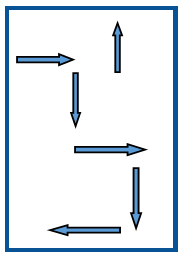Anyone who spends a lot of time thinking about how Americans are persuaded will have no shortage of suggested strategies for particular situations. “Strategic Communication” is its own distinct sub-area of the communication field, mostly predicated on the idea that certain rhetorical inputs are likely to lead to particular effects. Most of us employ some version of this model. For example, you may be confident about predicting what will happen when you push Uncle Fred’s hot buttons.
Researchers in the 1930’s looking at the effects of film content on audiences similarly assumed large and uniform results: “magic bullets” that would work on most members in the same way. In our time, we may think that reminding a supporter that Trump’s actions offend the norms of the office will soften their enthusiasm. For example, he recently decided he would comment on Federal Reserve policy: a line no modern president has crossed. One model for the prediction is “dissonance theory.” You might assume that Donald Trump’s behavior is at odds with the supporter’s core values. Pointing that out ought to create mental stress and, therefore, the supporter’s reassessment. That’s one strategic equation. Yet, the attitudes of supporters seem reasonably resilient. Indeed, there is usually no “magic bullet” for producing change. Those 30’s researchers were surprised by the non-uniform responses their received. And it’s clear that attacks on the President frequently have the reverse of their intended effects. His supporters have dug in.
The reasons we don’t get straight line effects are numerous, but mostly cluster around some version of what psychologists used to call “selective perception” and what communication people call “motivated reasoning.” In both cases we look for alternative stories or accounts that can mitigate another’s assertion that we hold inconsistent views. We find ways to dismiss the world we don’t want to see.
 What we are missing in this straight-line sequence is the serendipity of individual initiative.
What we are missing in this straight-line sequence is the serendipity of individual initiative.
In addition, blame our desire for simple cause and effect reasoning. A common social science paradigm usually has us looking for first causes and subsequent effects. Ostensibly, these chains offer a straight line of actions and subsequent behavioral results. But what we are missing in this view is the serendipity of individual initiative: what sociologist Robert Merton partly meant by the familiar idea of “unintended consequences.” It asks us to make generous allowances for human u-turns, wrong turns, delays, and alternate routes. Indeed, some of us are world-class deniers.
When I entered into study of persuasion years ago I was certain that first causes could be identified with some reliability. But years of study have moved me closer to a model that gives much wider latitude to the possibilities of disruption and denial. This is a kind of ‘pattern of no patterns’ that seems built into the American character and is easily obscured in social science reporting that needs to show clear effects.
It is human nature to be unpredictable. Sometimes even Uncle Fred may surprise us.
![]()

